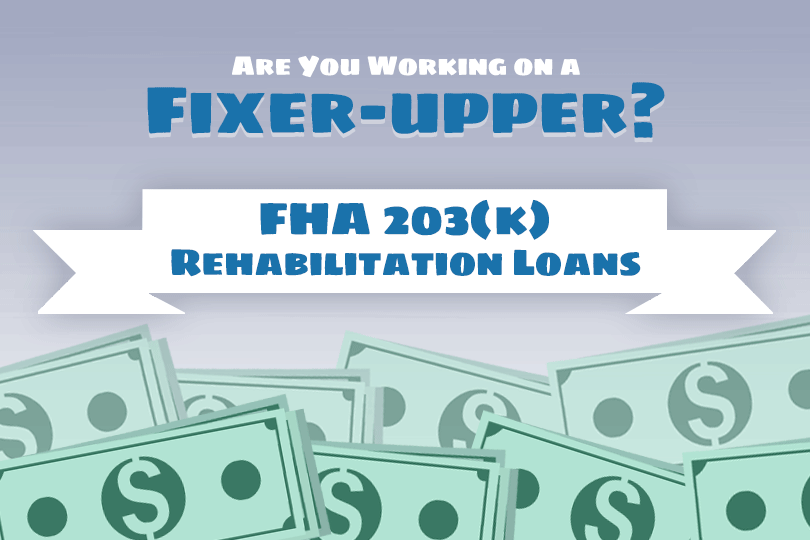FHA Programs for Fixer-Upper Homes
November 8, 2022
The FHA 203(k) Rehabilitation Loan
The fact is that repairs and renovations to your home cost a lot of money. Luckily, the FHA has an option for those with fixer-uppers on their hands. The FHA 203(k) Rehabilitation Mortgages allows borrowers to finance the funds for renovations to a home. This loan program can be used for purchasing a home, and if can also be secured as a refinance if you already have a mortgage on it.
In the case of a home purchase, the loan covers the purchase as well as the rehabilitation of the home, as part of a single mortgage. This loan can be used to finance a property that is at least one year old. Part of the funds go toward paying the seller, and the rest is placed in an escrow account, disbursed as rehabilitation goes on.
Additionally, the refinance option is not exclusively for FHA borrowers. If you need funds for renovation on a home you are currently paying off with a conventional mortgage, you can refinance to the FHA 203(k) Rehabilitation Mortgage.
The FHA Rehabilitation Loan comes with all of the flexible borrower guidelines that the FHA offers on its other mortgage and refinance programs. However, there are a few other factors that come into play. To qualify for an FHA Rehab Loan, the total cost of repairs must amount to at least $5,000. The FHA Loan Limits still apply, so the total value of the property must fall within the lending limits for that area. With Rehabilitation Loans, the property value is determined by whichever is less:
- The home’s value before rehabilitation plus the calculated cost of repairs, or
- 110% of the appraised value of the property after repairs.
There are some remodeling projects that aren’t as extensive as others. You may not need an entire home loan to afford the renovations you have in mind. In that case, there is a “limited” version of the 203(k) Rehab Loan that lets you borrow without committing to the full mortgage. FHA's Limited 203(k) program lets borrowers finance up to $35,000 for renovations.
To qualify for the limited version of the FHA Rehab Loan, the renovations need to meet some requirements. Here are some of the factors that disqualify a borrower:
- The renovation timeline is expected to be six months or more.
- The project requires more than two payments per specialized contractor.
- The required repairs in the appraisal require a consultant to develop a specification of repairs.
- The repairs require plans or architectural exhibits.
You may also be able to combine the FHA 203(k) Rehab Loan with other FHA programs, such as the FHA Energy-Efficient Mortgage option. Ask your lender about these add-ons, and see what the best course of action is for you and your home!
------------------------------
RELATED VIDEOS:
Disclosures Give Transparency to Borrowers
Understanding the Purpose of Your Mortgage Down Payment
Putting Money Into Your Escrow Account

FHA Loan Articles
May 14, 2025When you buy a home with an FHA mortgage, you must pay for both mortgage insurance and insurance to protect your property while paying on the loan. There are important nuances to these insurance policies to know before you start. What's the difference between insurance against water damage and flood insurance? That's just one example of the "hidden" expenses of buying your new home to budget for.
May 13, 2025Buying a home with an FHA mortgage means you'll need to know the FHA guidelines about the types of properties you can purchase with an FHA single-family home loan for residential purposes. How well do you understand these rules? Are you truly ready to start house hunting? We examine some key aspects of the process.
May 12, 2025FHA single-family home loans require a minimum 3.5% down payment for typical transactions. Saving for this requires planning and dedication, but it’s not impossible to save enough to make the down payment. How do people typically budget and save for this? Your financial needs and goals will play a big role in how much you decide to set aside for your new home, but here are some options to think about...
April 30, 2025 In a previous post, we discussed why FHA borrowers should carefully consider whether paying for discount points truly serves their best interests, focusing on factors like short-term homeownership, opportunity cost, FHA mortgage insurance, and the prevailing interest rate environment. Discount points are an option for borrowers willing to pay a fee to lower the interest rate by a set amount. This is not right for all borrowers, and you don't want to pay for points you won't benefit from during the loan term.
April 29, 2025Are you considering buying a home with an FHA loan? You'll likely talk to your participating lender about FHA loan "discount points" – fees you pay upfront for a lower interest rate on your mortgage. The idea behind discount points is a straightforward exchange: you spend money today to reduce your interest rate. Typically, one point equals one percent of your total FHA loan. In return, your interest rate might decrease by an amount you and the lender agree upon.







